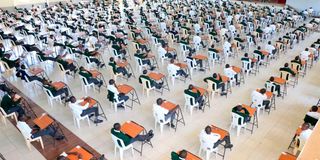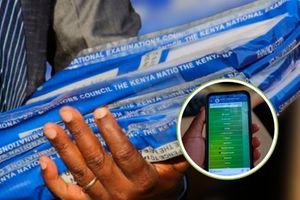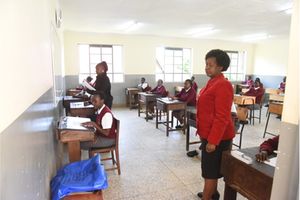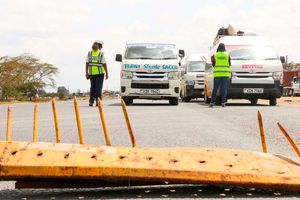
A Kenya Certificate of Secondary Education invigilator collects English Paper One from 385 candidates from Nakuru High on November 4, 2024. There were no reported hiccups during the start of this year’s examination in Nakuru County.
A huge candidature, analysis to weed out examination cheats, a new anonymised system, and caution to avoid mix-ups are among the reasons candidates who sat the Kenya Certificate of Secondary Education (KCSE) examinations will wait longer before getting their results, Nation can reveal.
Some 965,501 candidates who were registered for the 2024 exams will receive their results in early January, more than three weeks since the marking concluded, the Cabinet Secretary for Education Julius Ogamba has announced.
The marking ended last week and all the examiners have left the marking stations. Although Mr Ogamba did not give the exact date when the candidates will know how they performed in the examinations, the release of the results weeks after the conclusion of marking is a departure from recent practice when the Kenya National Examinations Council (Knec) has been releasing results just a few days after examiners leave the marking centres.
Since 2016 when then Education Cabinet Secretary Dr Fred Matiang’i instituted examination reforms, the results have been released just a few days after the marking ends. Previous long delays were blamed for allowing for the manipulation of results.
This year, the candidature is the largest in the history of the KCSE examinations. A source at Knec intimated that the huge number of candidates has played a role in the time taken to analyse the results. Knec is also analysing the results of the Kenya Primary School Education Assessment (KPSEA), which was undertaken by learners in Grade 6 ahead of their transition to junior school in January 2025.
Nation has also established that Knec is taking its time to carefully analyse the KCSE results following concerns raised by some examiners over malpractices in the examinations. Although Mr Ogamba termed the malpractices as ‘a few’, nothing is being left to chance to unearth the culprits.
“This year we did two serious exams – the KPSEA that was completed and the KCSE that was very well done and completed. There were a few challenges but we were able to handle those challenges,” said Mr Ogamba.
He was speaking during a stakeholder engagement at the Kenya Institute of Curriculum Development. Mr Ogamba insisted that the KCSE marking process is proceeding as scheduled despite encountering some initial challenges.
“Of those challenges were a few malpractices and those who were found to have engaged in those malpractices are facing court cases and we will be dealing with that. The examination marking is ongoing and we will be releasing the exams in early January 2025,” he said.
However, examiners who talked to Nation, in confidence, said that cases of cheating were detected in many centres and the cases were reported. Examiners pointed out the possible involvement of teachers in aiding the malpractices. In November, Nation reported on how teachers aid in cheating.
“During the tea and lunch breaks, examiners interact and discuss a lot. It is during such interactions I learnt that in several schools in certain regions, parents and [school] administrations come together to raise a certain amount of money which they use to bribe the supervisors, invigilators, security officers, and any other stakeholders in the administration of exams,” a source disclosed.
The account appears to be backed up by discussions in examiners’ WhatsApp groups where they discuss matters affecting them.
“The exam papers come in numbered boxes but in some boxes, the candidates had the same answers, including punctuation marks. An examiner can easily tell a student’s answer from a teacher’s. The cheating appeared well-coordinated in those centres,” another source said.
Another reason for Knec to take time before releasing the results is the new anonymised system which was used for the first time this year. Under it, the candidates, schools, and regions are not recognisable by names because Knec used unique security codes for identification.
Since the system has not been tested before, the council is cautious to be accurate and avoid a mix-up of details. It has been previously accused of inaccuracies that were blamed on technological challenges.
Unlike in the past, Knec did not avail extra question papers. The question papers also acted as the answer sheets to discourage photocopying.
“Some rogue teachers hide themselves in a room (a little far away from exam rooms) where they do the exams very fast, photocopy it, and pass them to the waiting invigilators who then take them to examination rooms for candidates to copy,” a source said.
In a previous education forum, the CEO of Knec, David Njegere said that the introduction of competency-based assessments will cure some of the challenges faced by summative assessments.
“In 2018, as KICD concluded the national pilot for the Competency-Based Curriculum (CBC), KNEC also conducted its pilot. This marked the first time in the country that assessments were preceded by a pilot. Subsequent assessments, including the Kenya Primary School Education Assessment (KPSEA) and the Kenya Junior Secondary Assessment, have all been based on these pilots,” said Dr Njegere.
He criticised the widespread distrust of teachers, arguing that this lack of confidence has prompted calls for supervisors, invigilators, and even police officers to oversee school-based assessments.
“We need to disabuse ourselves of the belief that teachers cannot be trusted to administer assessments professionally. Every year since 2019, we have conducted school-based assessments, and the results consistently show a normal curve, proving teachers are objective and reliable. This trust deficit is unwarranted and unfounded. Teachers have demonstrated their professionalism time and again,” he said.
Dr Njegere noted that as the education sector prepares for the Kenya Junior Secondary Assessment next year, which will also build on lessons from previous pilots and assessments, he called for collective trust and support for teachers, urging stakeholders to focus on strengthening the education system rather than casting doubt on its implementers.










